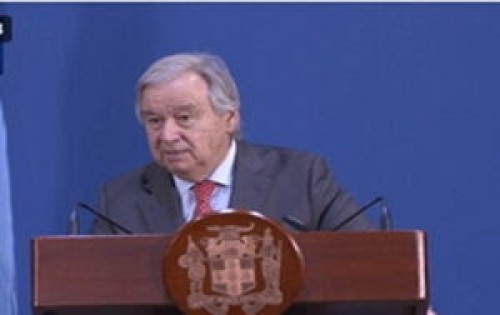KINGSTON, Jamaica – The United Nations Secretary General, Antonio Guterres, has called for an end to the “moral” problem which he used to describe the “injustice” in the existing world economic order.
 UN Secretary General Antonio Guterres addressing news conference in Jamaica (CMC Photo)“We are today facing when we look at the present international financial architecture, a moral problem, a power problem and a practical problem,” Guterres, who held talks with Jamaica’s Prime Minister, Andrew Holness, told a news conference.
UN Secretary General Antonio Guterres addressing news conference in Jamaica (CMC Photo)“We are today facing when we look at the present international financial architecture, a moral problem, a power problem and a practical problem,” Guterres, who held talks with Jamaica’s Prime Minister, Andrew Holness, told a news conference.
The UN Secretary General referring to the moral problem reminded journalists that during the COVID-19 pandemic “vaccines were not evenly distributed."
“You all remember that Europe, the United States and other rich countries were able to pinch billions in order to support their economies after COVID, the recovery of their economies to support their populations”.
He said because not adequate care was taken leading to increased in inflation, developing countries are now feeling the brunt of their policies.
“Then because there was huge global liquidity problem, the IMF was able to issue special drawing rights (SDR),” he said, noting that some countries like Europe received US$180 billion, while the African countries, three times the population of Europe received 34 billion.
“There is something fundamentally wrong in the rules, because these are the rules in the system which allow for the injustice to take place,” he said, noting small island developing states “do not face adequate countries debt relief mechanisms and do not face the possibility of access of concessional funding at the level that is necessary because they are considered to be middle income countries…
“…this is injustice because small island developing states in particular have a high level of vulnerability because of the structure of their economies because of their geographic location, their size and because of the enormous impact they suffer because of climate change”.
“So there is a serious moral problem in the international financial system. And there is a power problem.
The Bretton Woods institutions were created after the Second World War, Jamaica was not independent at the time, most African countries were not independent at the time and obviously the structure of what was created …with small adaptations in the last decades reflect the power relations that existed after the Second World War.
“They are outdated and so the system is unfair and dysfunctional. The system needs reform to adapt it to the realities of the global economy,” Guterres said, noting that power problems are always difficult to solve.
He said in addition, the international community is faced with a number of practical issues and “even with the current situation, much more could have been done and much more should be done in relation to a better link between climate and finance”.
He said if the multi-lateral development banks change their business models and new approach to risks “and they are able to use their resources to leverage massive excess to private finance at reasonable costs for developing countries much more can be done in new instruments…for example swaps for debts…
“So there are a lot of things that can be done if there is political will to do so even if we will not be able to solve…the moral problem and the power problem,” he said, adding “we are determined to correct this and this is the reason for my visit”.
A UN statement issued ahead of his arrival here said that during their meeting the Secretary-General and the Prime Minister will discuss a wide range of issues, including the impact of the climate crisis in the Caribbean and the upcoming mid-term review of the global framework for disaster risk reduction.
They will also discuss Jamaica’s leadership in efforts to reform the global financial architecture so that developing countries, including middle-income countries, can restructure and sustainably manage debt as well as access, technology and finance at affordable rates to invest for growth and inclusive, sustainable development.
Jamaica is the co-chair of the Group of Friends on Financing for Development, alongside Canada.


